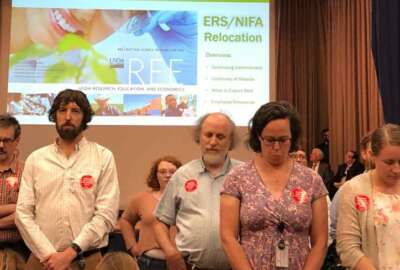USDA asking employees who had previously declined relocation to work longer in Washington
Faced with widening workforce gaps, the Agriculture Department is asking some of the employees impacted by the USDA relocation to Kansas City to continue workin...
Best listening experience is on Chrome, Firefox or Safari. Subscribe to Federal Drive’s daily audio interviews on Apple Podcasts or PodcastOne.
This story was updated on Thursday, Sept. 12 at 1:45 p.m. to reflect additional information about the impact the new “report date” might have on some employees and their buyout payments.
The Agriculture Department is asking some employees who have previously declined relocation to Kansas City later this month to work longer in Washington, D.C.
The department is changing the report date to Dec. 9 for three teams at the Economic Research Service, which includes nine employees who accepted relocation and 15 employees who have declined, USDA told Federal News Network. It will change the report date for three teams at the National Institute of Food and Agriculture to March 30, 2020, which include six employees who have agreed to relocate and 38 who have declined, the department said.
Employees can change their minds about relocation at any point before their report date.
The department has previously told employees they were expected to either report to Kansas City by Sept. 30 or leave their current positions by the end of the month.
“With mission continuity as a high priority, the department has instructed ERS and NIFA to be agile with all available resources to meet workforce needs,” a USDA spokesperson said in a statement to Federal News Network. “The department has maintained from the onset that it would continuously evaluate needs on a case-by-case basis as well as evaluate the impact those needs have on agencies’ mission-critical work. The extension, in addition to prioritizing hiring for vacancies occurring on these teams, will help achieve mission continuity during the relocation so the department can deliver timebound functions and continue to do right by those it serves.”
The American Federation of Government Employees said NIFA management has started to send letters to workers who had previously declined the USDA relocation, asking them to continue their work in Washington until a later date.
The change is creating confusion for ERS and NIFA employees, Peter Winch, a special assistant to AFGE’s national vice president, said in an email to Federal News Network.
“We are concerned that the employees who have already made other plans and are leaving payroll will be denied the severance or [Voluntary Separation Incentive Payments] they are due — and that those who stay on in D.C. may now get the Kansas City wage instead of the D.C. locality pay rate,” Winch said.
The ERS and NIFA workforces voted to form collective bargaining units in the leadup to USDA’s site announcement back in June.
New dates may impact ERS, NIFA employees’ buyouts
Some ERS and NIFA employees who were eligible for a buyout, may in fact, lose the payment.
Separating employees had been told last month that due to the interest and demand in potential buyouts, eligible workers would receive VSIPs of $10,000, not the statutory maximum payment of $25,000.
USDA offered VSIPs to all eligible workers — 43 ERS and 48 NIFA employees — last month.
But VERA/VSIPs were contingent upon an employee’s separation from the agency at a specific time, the department said in an Aug. 23 letter to one ERS employee, which Federal News Network obtained.
“Should you accept the VSIP and separate before Monday, Nov. 25, 2019 or after Friday, Dec. 6, 2019, the VSIP incentive and any associated VERA will be revoked,” the letter reads.
Essentially, ERS or NIFA employee who had planned to leave the department with a buyout must continue working for their agencies longer than initially planned to keep the VERA/VSIP payment.
The department said Thursday ERS employees with the new “report dates” could still accept a VERA/VSIP offer but must leave the agency between those dates. For the identified NIFA employees who have declined their reassignments to Kansas City and have new March “report dates,” they must leave the agency between March 16 and March 28 in order to receive the buyout.
The changes to the report date for some is the latest sign the USDA relocation has created further workforce gaps at ERS and NIFA.
USDA said late last month it was exploring whether retired ERS and NIFA employees might be interested in returning to work at their former agencies as part-time reemployed annuitants.
In an attempt to assuage congressional concerns, USDA has told lawmakers it expected to lose expertise due to the relocation, but it’s unclear just how much attrition the department anticipated in planning for the move to Kansas City. The department has previously told Federal News Network it had an aggressive hiring strategy to sustain continuity at the two bureaus and that it was making its best effort to ensure separating employees had the resources they needed.
To date, 15 ERS and NIFA employees, which include both new hires and relocating staff, are working at USDA’s existing facility in Kansas City, the department spokesperson said.
That number will increase as it nears the Kansas City report date of Sept. 30, the USDA spokesperson added, and employees can change their minds about relocation at any point before their report date.
It’s still unclear exactly how many employees are leaving the ERS and NIFA.
According to the department’s count in mid-July, 99 out of 171 workers at ERS who had been chosen to relocate have declined, while 151 out of the selected workforce of 224 at NIFA had also rejected USDA’s mandatory reassignments to Kansas City.
Members of Congress, mostly Democrats, have been highly critical of the USDA relocation. But many of them have since turned their attention to the Interior Department, which is also proposing a relocation of some headquarters employees at the Bureau of Land Management to Grand Junction, Colorado, and other western states.
Rep. Jennifer Wexton (D-Va.) is one of several House Democrats in the national capital region who has been vocal in her opposition of the USDA relocation.
“The relocation of ERS and NIFA was always meant to shut down independent and objective research, because facts are inconvenient for this administration,” she said Wednesday in a statement. “Clearly, there are critical services that ERS and NIFA must provide, and the deliberate decimation of USDA’s workforce makes it impossible for them to do so.”
Copyright © 2024 Federal News Network. All rights reserved. This website is not intended for users located within the European Economic Area.
Nicole Ogrysko is a reporter for Federal News Network focusing on the federal workforce and federal pay and benefits.
Follow @nogryskoWFED






